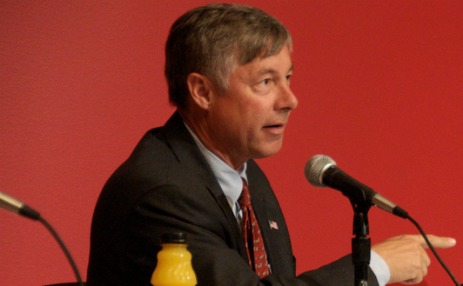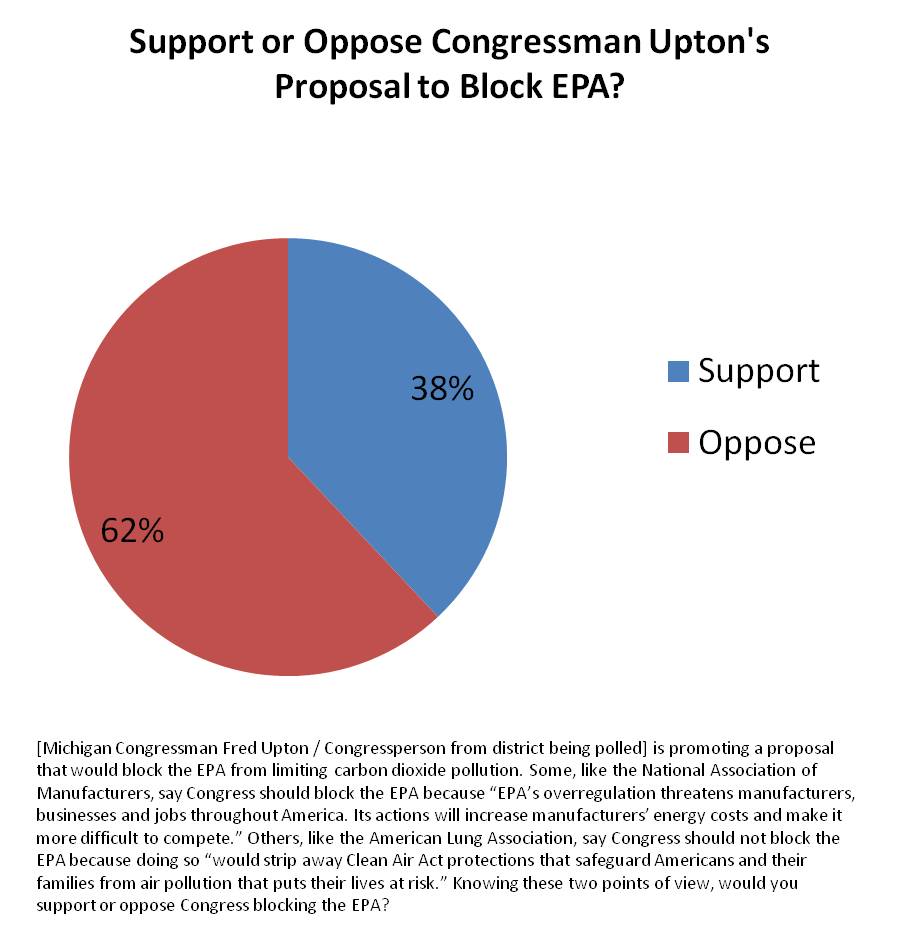Cross-posted from the Natural Resources Defense Council.
Yesterday, members of Rep. Fred Upton’s (R-Mich.) House Energy and Commerce Committee held their first hearing on Chair Upton’s proposal to block the Environmental Protection Agency from updating Clean Air Act safeguards to protect our health from life-threatening carbon pollution. (Hat tip and bow to EPA chief Lisa Jackson who withstood hours of dirty air extremism from panel members, and didn’t give one inch on the EPA’s obligation to protect public health by limiting carbon pollution.)
We’ve already learned most Americans don’t support various proposals to eliminate or block the EPA, as Reuters, Time, and USA Today have reported.
But what about the views of the voters in the districts of specific members of Congress? Say, voters in Upton’s district? Do they support blocking the EPA, as their own representative is proposing? What about voters in the districts of other committee members who will have to vote on blocking the EPA in coming weeks?
Turns out, new polling shows that voters Upton’s are not at all behind him on this, and the voters in eight other districts we looked at aren’t either. Get the release here.
In fact, nearly two-thirds of Upton’s own constituents oppose his bill to block EPA from limiting carbon pollution:
Here’s a quick scan of the Upton results:
- 67 percent — including 60 percent of Republicans — agreed with the statement that “Congress should let the EPA do its job,” as opposed to the minority who believe that “Congress should decide” what actions are taken to curb carbon pollution.
- 61 percent say that “EPA needs to do more to hold polluters accountable and protect the air and water.”
- 57 percent favor “the EPA setting new standards with stricter limits on air pollution.”
You can read the full report on Upton’s district here [PDF].
We also found solid majorities oppose Upton’s proposal in the districts of eight other committee members: Reps. Mary Bono Mack (R-Calif.), Cory Gardner (R-Colo.), Adam Kinzinger (R-Ill.), Charlie Bass (R-N.H.), Leonard Lance (R-N.J.), Mike Doyle (D-Penn.), Charles A. Gonzalez (D-Texas), and Gene Green (D-Texas). You can view all the results in this single table [PDF] here or look at individual reports [all PDFs], linked below.
Rep. Mary Bono Mack (R-Calif.)
559 voters interviewed Feb. 4-5/margin of error: plus or minus 4.1 percent
- 59 percent say, “Congress should let the EPA do its job.”
- 53 percent say that “EPA needs to do more to hold polluters accountable and protect the air and water.”
- 56 percent oppose the Upton proposal “that would block the EPA from limiting carbon dioxide pollution.”
- 51 percent favor “the EPA setting new standards with stricter limits on air pollution.”
519 voters interviewed Feb. 4-5/margin of error: plus or minus 4.3 percent
- 66 percent say, “Congress should let the EPA do its job.”
- 54 percent say that “EPA needs to do more to hold polluters accountable and protect the air and water.”
- 61 percent oppose the Upton proposal “that would block the EPA from limiting carbon dioxide pollution.”
- 55 percent favor “the EPA setting new standards with stricter limits on air pollution.”
627 voters interviewed Feb. 4-5/margin of error: plus or minus 3.9 percent
- 72 percent say, “Congress should let the EPA do its job.”
- 63 percent say that “EPA needs to do more to hold polluters accountable and protect the air and water.”
- 66 percent oppose the Upton proposal “that would block the EPA from limiting carbon dioxide pollution.”
- 61 percent favor “the EPA setting new standards with stricter limits on air pollution.”
555 voters interviewed Feb. 4-5/margin of error: plus or minus 4.2 percent
- 67 percent say, “Congress should let the EPA do its job.”
- 65 percent say that “EPA needs to do more to hold polluters accountable and protect the air and water.”
- 64 percent oppose the Upton proposal “that would block the EPA from limiting carbon dioxide pollution.”
- 61 percent favor “the EPA setting new standards with stricter limits on air pollution.”
628 voters interviewed Feb. 4-5/margin of error: plus or minus 3.9 percent
- 74 percent say, “Congress should let the EPA do its job.”
- 70 percent say that “EPA needs to do more to hold polluters accountable and protect the air and water.”
- 72 percent oppose the Upton proposal “that would block the EPA from limiting carbon dioxide pollution.”
- 69 percent favor “the EPA setting new standards with stricter limits on air pollution.”
692 voters interviewed Feb. 4-5/margin of error: plus or minus 3.7 percent
- 74 percent say, “Congress should let the EPA do its job.”
- 77 percent say that “EPA needs to do more to hold polluters accountable and protect the air and water.”
- 73 percent oppose the Upton proposal “that would block the EPA from limiting carbon dioxide pollution.”
- 74 percent favor “the EPA setting new standards with stricter limits on air pollution.”
Rep. Charles A. Gonzalez (D-Texas)
506 voters interviewed Feb. 4-6/margin of error: plus or minus 4.4 percent
- 71 percent say, “Congress should let the EPA do its job.”
- 72 percent say that “EPA needs to do more to hold polluters accountable and protect the air and water.”
- 70 percent oppose the Upton proposal “that would block the EPA from limiting carbon dioxide pollution.”
- 71 percent favor “the EPA setting new standards with stricter limits on air pollution.”
597 voters interviewed Feb. 4-5/margin of error: plus or minus 4 percent
- 64 percent say, “Congress should let the EPA do its job.”
- 72 percent say that “EPA needs to do more to hold polluters accountable and protect the air and water.”
- 65 percent oppose the Upton proposal “that would block the EPA from limiting carbon dioxide pollution.”
- 67 percent favor “the EPA setting new standards with stricter limits on air pollution.”
The next step for the committee is to markup and vote on Upton’s proposal to block the EPA (or as my colleague David Doniger writes, his proposal to put polluter profits ahead of public health).
Let’s see if the committee members pay attention to the views back home.



